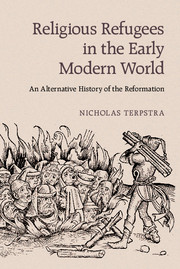4 - Mind and Body
Published online by Cambridge University Press: 05 August 2015
Summary
The social body had a mind, but was never of one mind. Its many members had varying physical needs, and no single way of meeting them. Thus far we have seen how tensions of the late medieval period began to complicate Europeans' understandings of what it meant to be a Corpus Christianum, or Body of Christ. In this chapter, we will see how ways of thinking and ways of acting began to diverge in that Body, and tear it apart. We have already seen how anxieties about external and internal threats gripped Europeans from the fifteenth century, and how they responded with strategies to separate, contain, prosecute, and purge these threats. The result was a flood of religious exiles and refugees that poured out of particular nations and cities and washed around Europe and across the globe from the fourteenth through the eighteenth centuries. It was because of these late medieval and Renaissance-era tensions that the religious refugee and exile emerged as mass phenomena in the early modern period. We have also looked at the paths that some individuals took in their thinking and with their feet when they were separated, prosecuted, or purged. Their mental and physical migrations took them across Europe, the Mediterranean, and the Atlantic, and transformed the places where they settled. The migrations of religious refugees and exiles fundamentally shaped early modern political, economic, and cultural life.
Religious doctrines lay at the heart of both the threats and the strategies, and thus far we have sketched only some of the main differences between Jews, Christians, and Muslims, and between Catholics, Lutherans, Radicals, Calvinists, and others within Christendom. A thorough comparative discussion of the theologies of the Reformation is beyond the scope of this book. Yet it is helpful to look briefly at a few of the doctrines that were most contentious and were most often used to mark and divide. We will then see how religious communities worked to put their beliefs into action through different forms of charity. Many religious refugees and migrants needed it, and many religious communities thought that help to the poor and needy was the best measure of true faith.
- Type
- Chapter
- Information
- Religious Refugees in the Early Modern WorldAn Alternative History of the Reformation, pp. 184 - 240Publisher: Cambridge University PressPrint publication year: 2015



